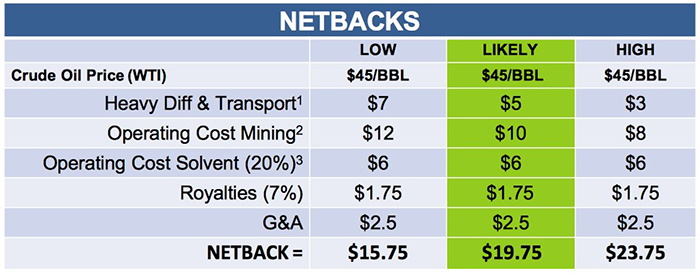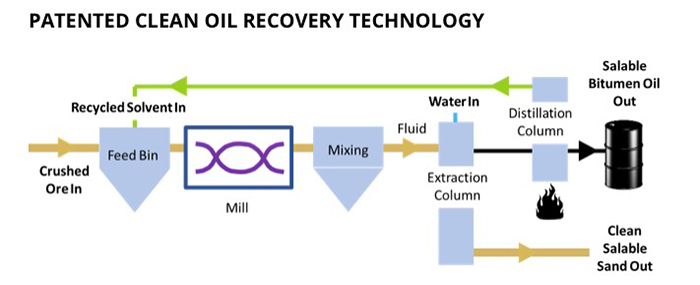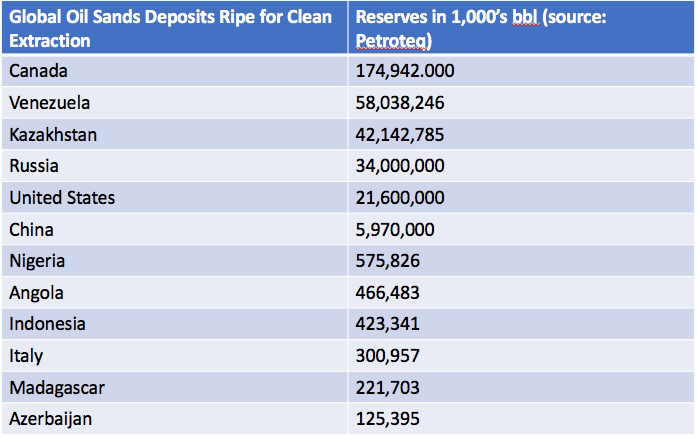Across the world’s big energy markets, the energy war rages on.
OPEC and U.S. producers have been competing for years, but it’s now clear who’s winning this fight.
American production of crude oil rose to an all-time high, surpassing 10 million bpd. In February, the International Energy Agency predicted that U.S. shale output could meet all new global demand, thanks to its “extraordinary growth.”
In the battle for global market share, the U.S. is winning, as Saudi exports reach their lowest levels since the 1980s.
As Saudi Arabia is forced to maintain costly production cuts, the United States has embraced an energy revolution.
OPEC cuts, led by the cartel’s leader Saudi Arabia, have propped up prices, but there’s no question how U.S. companies have come out on top.
By embracing new technologies, innovations in upstream and downstream, and achieving maximum efficiency, American companies on the shale patch and elsewhere have unlocked American energy potential.
But while shale has been the big story, it’s really just the beginning.
One little company is preparing to take U.S. energy to the next stage: unlocking oil trapped in U.S. oil sands for as little as $22/barrel and using blockchain-based supply-chain management to improve efficiency and cut out the middlemen.
The company is Petroteq Energy Inc., and it’s here to help take U.S. energy dominance to the next level.
Petroteq doesn’t want to just produce oil from oil sands much more cheaply—it intends to license advanced technology globally, targeting not only the 1 trillion-plus barrels of oil equivalent in sands in Utah, Colorado and Wyoming, but the trillions of barrels worth everywhere around the world.
Plus, Petroteq is harnessing the hotter-than-hot Blockchain sector to transform energy market deals and data.
Now, with oil prices rising and predictions of future upwards movement and new tech winning the war for North America, here are 5 reasons to watch Petroteq very closely:
87 million barrels of oil equivalent
Oil sands don’t have the best reputation: people tend to think of oil sand extraction as dirty and expensive.
The tar sands of Canada, one of the biggest petroleum deposits on earth, were so expensive to exploit that most majors had to divest from their holdings there after the oil price crashed in 2014.
But Petroteq is getting ready to change that, thanks to a phenomenal resource in Utah and an innovative new method for extracting oil sands crude.
The State of Utah is home to more than half of all U.S. oil sands deposits, and the Uintah region has been producing oil since the 1950s. It’s got more than 32 billion barrels of oil equivalent in sands waiting to be extracted from 8 major deposits. It’s also got fantastic infrastructure, with 5 major refiners with truck routes to Salt Lake City.
And it’s right there—in Asphalt Ridge—that Petroteq has an estimated 87 million barrels of oil equivalent.
Even better, this is heavy oil-producing oil sands that can be accessed directly from the surface, so there’s no risk of running into a ‘dry well’.
Costs to produce are expected to come in at only $22 a barrel.
With one plant, Petroteq says its potential is $10 million a year in profit with $25 per barrel production costs at today’s oil prices.
They acquired Asphalt Ridge for $10 million, and they’ve already proved that they can extract the oil from the sands and the shale. Permits to produce are already in place, and 10,000 barrels were produced from the property in 2015.
By the end of March the company expects to produce 1,000 bpd. The plan is to reach 5,000 bpd by 2019 at a cost of production of as low as $18 per barrel. And there’s potential, says Petroteq, to achieve 30,000 bpd with proven reserves.
Demand is expected to be voracious with oil that is produced in the U.S. cleanly and efficiently. And that’s just the oil from a single plant: This story gets much bigger if you read on…
The projected netbacks are impressive…

So, while oil sands in Canada are prohibitively expensive to produce in today’s oil-price environment, Petroteq has found a way to produce in Utah for a targeted $22 per barrel.
And it’s doing it in a clean, safe and efficient way with proprietary technology…
War-winning proprietary EOR tech
Winning the oil war against OPEC, and helping the U.S. to become energy independent is all about technology. And U.S. national interest right now is all about increasing domestic energy sources.
Technological advances such as Petroteq’s proprietary Liquid Extraction System will become a key focus for developing U.S. oil sands deposits—and not just in Utah.
Petroteq already has a significant claim to fame: Its patented oil extraction technology is the first ever to generate production from Utah’s massive heavy oil resource.
Existing oil sands extraction technologies use tons of water and leave toxic trailing ponds. Petroteq’s system produces oil and leaves behind nothing but clean, dry sand that can be resold as fracking sand or construction sand or simply returned to Mother Nature.
In tests to date, it extracts over 99 percent of all hydrocarbons in the sand, generates zero greenhouse gases and doesn’t require high temperatures or pressures.
For Utah’s 32 billion barrels this tech could be the Holy Grail.
This is how it works:

The end result? The extracted crude oil is free of sand and solvents and then pumped out of the system into a storage tank.
“The wet tech kills the environment,” says Petroteq Chairman and CEO Aleksandr Blyumkin, “but we use green additives that allows the sand to be removed in a very clean manner. No other company has what we have in this space.”
Technology like Petroteq’s can help make American oil for Americans: full energy independence.
This technology is aimed to be deployed to cleanly unlock oil resources representing hundreds of millions of barrels of oil around the world. Licensing is a revenue stream that can flow to Petroteq with no associated capital expenditure. This tech is so good, it could sell itself.
Worldwide, the licensing opportunities are vast, with over 12 countries home to major oil sands deposits.

Fortunes can be built on licensing fees, and Petroteq could have a big advantage in this market.
Blockchain-based solutions
Nothing could change oil industry supply chain management more than blockchain.
Blockchain works to ensure secure and verified transactions between parties without a lot of third-party involvement. Deals that take weeks instead take hours, or even minutes, to secure. And there’s no need for expensive middle-men.
And now, oil and gas is getting in on the action.
Supermajors BP, Shell and Statoil are getting into blockchain because it’s like what computers were three decades ago and it could make oil and gas trading a lot easier. They want to create a secure, real-time blockchain-based digital platform to manage energy transactions, without all that fussy paperwork.
Every single industry the world over will likely switch to blockchain because it’s efficient; it’s transparent; and it creates savings.
Deloitte released a report showing all the ways blockchain and crypto-currency technology could be applied to the oil and gas industry. And Petroteq wants to lead the charge with its new supply-chain management software, “Petrobloq.”
In January Petrobloq reached an agreement with Pemex, the Mexican state-owned oil company. Through its Petrobloq subsidiary, Petroteq is developing a supply chain management system for Pemex that could radically improve efficiency.
Petrobloq’s technology is being designed to function as a digital ledger for oil and gas transactions, one that could become widely-used throughout the energy industry.
Petrobloq has attracted attention: it was cited by Geoffrey Cann, director at Deloitte specializing in oil and gas, as a contender for best blockchain tech in the energy sector.
This new tech puts Petroteq on the forefront of the blockchain revolution that could be about to sweep through the entire oil and gas industry.
Skin in the game expert management team
The Petroteq management team is savvy and forward-thinking. That’s why it sees the opportunity not only in producing the first clean oil sands, but also in licensing its proprietary oil sands and blockchain tech worldwide.
This is where some of the brightest minds in extraction tech, chemistry, and blockchain come together to form a dream team.
The Chairman and CEO of Petroteq, Aleksandr Blyumkin, has championed this Company and technology with millions of dollars, including an interest-free loan to expand the production capability at its Temple Mountain facility in Utah.
Founder and CTO Dr. Vladimir Podlipskiy is a 23-year veteran in chemistry, R&D and manufacturing, and a chemical scientist from UCLA. He’s the oil extraction tech genius with a line-up of patents for everything from oil extraction and mold remediation to fuel reformulators.
President Dr. R. Gerald Bailey is a former Exxon president of Arabian Gulf operations, Dr. R Gerald Bailey. He believes in the technology and the company’s ability to not only turn a profit, but also protect the environment while doing so. He’s got more than 50 years of international experience at all spots along the oil and gas chain behind him, including as operations manager of Qatar General Petroleum Corp., Exxon Lago Oil in Aruba and Esso Standard Libya.
Chief Geologist Donald Clark, PhD, a widely published geologist and consultant, is the blockchain tech genius in this group, responsible for providing input to financial models, analyzing commodity price fluctuations and handling operational and transportation costs of oil and natural gas.
And the team supporting them will be working towards licensing-Petroteq’s technology in as many countries as they can.
Prices on the rise, heavy oil demand shifting up
Now is the time to pay attention to Petroteq for two big reasons. The first is the likely imminent spike in demand for heavy oil.
President Donald S. Trump has announced a $1.7 trillion infrastructure plan. Billions of dollars will be deployed to rebuild U.S. infrastructure and it requires exactly the kind of heavy oil that Petroteq can produce from oil sands.
U.S. production growth has focused on light oil, and heavy oil is in strong demand, particularly on the Gulf Coast, where the billions of dollars put into heavy oil refineries means it needs a lot of oil to feed them.
Heavy oil traditionally trades at a discount, but as demand rises, the discount should start disappearing.
This is a story of extracting costs of $22 per barrel of oil…in a $70 world.
Second, when Petroteq starts licensing out its blockchain and oil sands tech, the royalties it gets could be massive. The U.S. has billions in trapped oil sands crude that Petroteq tech may be able to get at for costs of only $22 per barrel.
The Petrobloq tech could become highly-sought after, as energy firms embrace blockchain to cut costs and streamline supply chain management and transactions.
While the Saudis fumble about in the dark, cutting production and losing market share, the U.S. is primed to become the world’s dominant energy producer. And it’s all thanks to innovation from companies like Petroteq.
Other companies to watch over the coming months:
Celestica Inc. is a manufacturer of electrical devices used in IT, telecommunications, healthcare, defense and aerospace industries. The company has seen strong growth YoY which we expect to continue as the sales expectations are almost 3% better than last year’s.
While many investors thought the stock was overvalued after a stellar run in 2016, the recent correction and volatility in the stock has attracted new buyers and the stock has recovered since.
While telecommunications stocks have been volatile recently, defense, IT and aerospace industries have outperformed and while many see limited upside, these industries continue to surprise both investors and analysts.
Pengrowth Energy Corp.: Another company that looks to have halted its falling stock price and is now preparing to ride the bullish sentiment in oil markets. Having shed a lot of excess weight this year in massive asset selloffs, investors can expect a much leaner and meaner Pengrowth in 2018.
For those investors who like to follow the smart money, billionaire investor Seymour Schulich bought millions of extra shares in Pengrowth in early October, boosting his position from 19 percent of the stock to 24 percent. He claims that he is confident that oil and gas is going up.
TransCanada: is a major oil and energy company based in Calgary, Canada. The company owns and operates energy infrastructure throughout North America. TransCanada is one of the continent’s largest providers of gas storage and owns and has interests in approximately 11,800 megawatts of power generations.
With TransCanada’s massive influence throughout North America, it is no wonder that the company is among one of Canada’s highest valued energy companies. Investors can feel comfortable with the company due to its huge and diverse portfolio, and continuing eye for success.
Power Financial Corp: Montreal-based Power Financial Corp has been in the finance industry since 1984. The company operates in three segments: Lifeco, IGM and Pargesa Holding SA (Pargesa). And, with its holdings in a diversified portfolio spanning the United States and Europe, Power Financial is a leader in its field.
Focusing its investments in the emerging FinTech industry, Power Financial stands to benefit by riding this wave into the future. The company’s forward-thinking attitude and liberal approach to technology is sure to leave investors satisfied.
We like PWF because it owns 60 percent of Wealthsimple, a leading robo-advisor for investing in ETF portfolios.
EXFO Inc: EXFO isn’t new to the Canadian tech sector. The company was founded in 1985 in Quebec City, and its original products were portable testing products for optical networks. Since then, the company has acquired and build 3G, LTE, protocol, copper/xDSL, IMS, and VoIP test and service assurance products.
Recent developments from EXFO are promising for long term growth potential. The new baseband unit emulation technology which is sure to be adopted on a large scale, as the tech offers operators a reduction of costs and a faster revenue stream.
EXFO Inc is a model in the telecommunications industry. With a market cap of $273-million, EXFO is strong, but still growing.
Article courtesy baystreet.ca
Business a.m.’s comment pages are a place for thought-provoking views and debate. These views are not necessarily shared by Business a.m.








The art of doing nothing: Nigeria & The World